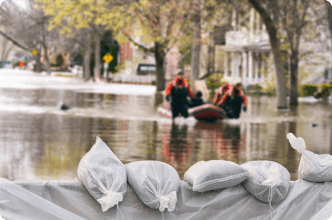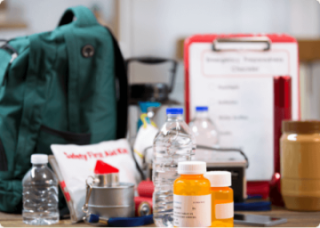Get Your Free Mesothelioma Guide

Find a Top Mesothelioma Doctor

Access Help Paying for Treatment

It is important for cancer patients and their families to have a plan in case of a catastrophic event or natural disaster. Learn how to make a cancer emergency plan with your family and your health care provider.


People with cancer have more to think about and prepare for in the event of an emergency.
They have to think about maintaining their treatment schedule and keeping up with their medications. Disasters such as hurricane Ian in 2022 can disrupt essential services, such as power, cell phone service and travel routes for days or weeks.
If power is down and roads are blocked, how will cancer patients access the chemotherapy they’re scheduled to have or get a refill on the prescription they need?
These are important things for people with mesothelioma to discuss with family and health care providers before an emergency occurs.
Planning ahead for an emergency or natural disaster is stressful but necessary. The more you do to prepare ahead of time, the better equipped you and your family will be to respond.
Not everyone goes through the effort and stress of making an emergency plan for their family, but they should.
The foundation of your emergency plan, such as evacuation routes, should be worked out with your family first. Then, cancer patients and their caregivers can make an emergency plan for cancer care.
Discuss your emergency plan with your family to ensure everyone is on the same page.
Make multiple copies of your plan and important contact information. Each member of your family should have a copy.
Get Your Free Mesothelioma Guide

Find a Top Mesothelioma Doctor

Access Help Paying for Treatment

Cancer patients have a weakened immune system that makes them susceptible to infection, bleeding, injury and fatigue.
People with mesothelioma may have unique needs during a disaster.
For example, some mesothelioma patients have medical devices that require special maintenance or travel accommodations.
Cancer emergency preparedness requires time and effort. People with mesothelioma may not feel like they have the energy to make an emergency plan, but they need one and should reach out to family and caregivers for help.
Don’t wait until a disaster strikes. Prepare now to make things easier on yourself in case of an emergency.
Recommended ReadingYour web browser is no longer supported by Microsoft. Update your browser for more security, speed and compatibility.
If you are looking for mesothelioma support, please contact our Patient Advocates at (855) 404-4592
The Mesothelioma Center at Asbestos.com has provided patients and their loved ones the most updated and reliable information on mesothelioma and asbestos exposure since 2006.
Our team of Patient Advocates includes a medical doctor, a registered nurse, health services administrators, veterans, VA-accredited Claims Agents, an oncology patient navigator and hospice care expert. Their combined expertise means we help any mesothelioma patient or loved one through every step of their cancer journey.
More than 30 contributors, including mesothelioma doctors, survivors, health care professionals and other experts, have peer-reviewed our website and written unique research-driven articles to ensure you get the highest-quality medical and health information.
My family has only the highest compliment for the assistance and support that we received from The Mesothelioma Center. This is a staff of compassionate and knowledgeable individuals who respect what your family is experiencing and who go the extra mile to make an unfortunate diagnosis less stressful. Information and assistance were provided by The Mesothelioma Center at no cost to our family.LashawnMesothelioma patient’s daughter


Whitmer, M. (2024, November 27). Emergency Plan for a Natural Disaster. Asbestos.com. Retrieved July 15, 2025, from https://www.asbestos.com/support/natural-disaster-emergency-plan/
Whitmer, Michelle. "Emergency Plan for a Natural Disaster." Asbestos.com, 27 Nov 2024, https://www.asbestos.com/support/natural-disaster-emergency-plan/.
Whitmer, Michelle. "Emergency Plan for a Natural Disaster." Asbestos.com. Last modified November 27, 2024. https://www.asbestos.com/support/natural-disaster-emergency-plan/.
Michelle Whitmer has covered science and medicine for Asbestos.com for more than 15 years. She has been featured in multiplatform media, including The New York Times and KYW Newsradio. Whitmer is pursuing American Medical Writers Association certification, has completed OSHA Asbestos Standard for the Construction Industry training and is CDC certified in Health Literacy.
Our fact-checking process begins with a thorough review of all sources to ensure they are high quality. Then we cross-check the facts with original medical or scientific reports published by those sources, or we validate the facts with reputable news organizations, medical and scientific experts and other health experts. Each page includes all sources for full transparency.
Please read our editorial guidelines to learn more about our content creation and review process.
